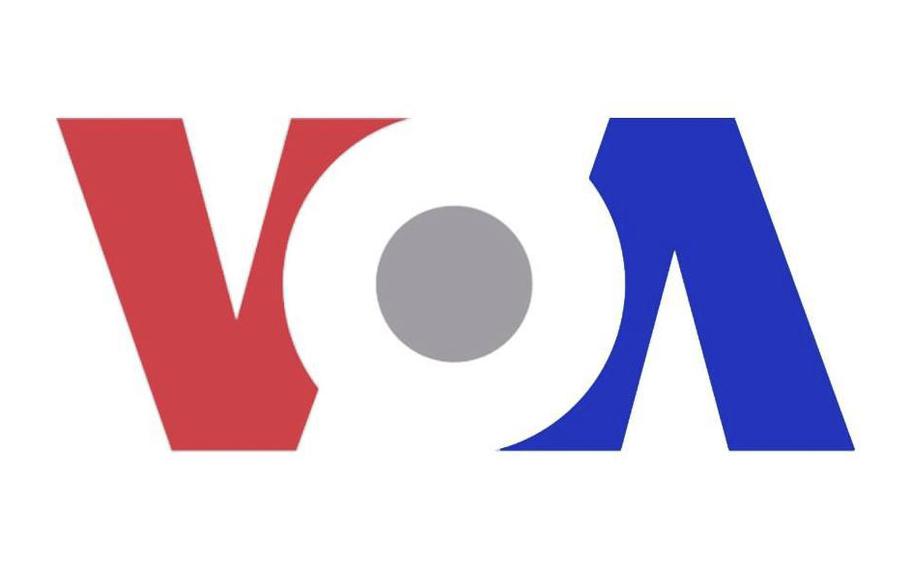
Two journalists in Voice of America’s Russian-language service have been accused of producing “propaganda” benefiting Russian president Vladimir Putin. (Voice of America/Facebook)
Voice of America placed two journalists in its Russian-language service on leave Friday after colleagues accused them of producing "propaganda" benefiting Russian president Vladimir Putin before they joined the U.S. government-funded broadcaster.
The journalists, Garri "Harry" Knyagnitskiy and Daria Davydova, were hired by VOA in November after working for several years at media outlets controlled by the Russian government or closely allied with it.
The decision, which came coincidentally on the first anniversary of the Russian invasion, follows the disclosure of an unusual letter signed by 15 VOA staff members and addressed to managers of the organization's Russian service. The journalists sought the dismissal of Knyagnitskiy and Davydova, writing that their previous work "contributed to the spread of Russian propaganda narratives and disinformation," vilified the United States and "laid the groundwork for the Kremlin to justify their full-scale invasion" of Ukraine last year.
The allegation is a particularly explosive one at Voice of America, which was founded in 1942 by the U.S. government to produce news and information to counter propaganda from Nazi Germany. The organization has evolved into a source of broadcast and digital news and cultural programming aimed at people living in countries whose authoritarian governments censor and control the news media.
The organization has periodically defended itself against suggestions of infiltration and corruption of its reporting, including in 2020 when its former government overseer, Michael Pack, said VOA was "a great place to put a foreign spy."
VOA has in the past hired reporters who've worked for state-controlled media organizations, valuing them for their language skills, cultural and historical knowledge and journalistic experience despite the censorship often imposed on them in their former countries. The organization says it subjects new employees to background investigations to vet any ties to foreign governments and supervises their work to ensure it meets American standards of neutrality and objectivity.
While VOA is funded by the U.S. government, its journalists are independent of direct government control. A statutory "firewall" shields it from outside political influence.
Among the four dozen languages in which VOA reports, the Russian service is one of its oldest, dating back to the earliest days of the Cold War. The division has 22 full-time employees and approximately 60 contract workers and stringers.
The employee letter was written in November, but wasn't publicly disclosed until this week when it was leaked to a Ukrainian publication, the Kyiv Post.
VOA officials have not explained why they took action now, several months after employees raised concerns.
The main body of the letter doesn't identify the two journalists, but an attachment cites Knyagnitskiy and Davydova by name.
According to the letter, Knyagnitskiy, a TV host, previously worked for NTV and RTVI, two Russian-language news organizations. NTV is owned by the Russian state-owned gas corporation, Gazprom, which has been sanctioned by the U.S. government. RTVI, which has operations in New York and Moscow, is privately owned, but reportedly has been funded by Sergey Chemezov, a wealthy Russian industrialist who has been associated with Putin since the 1980s.
"NTV is well known as a part of the Kremlin propaganda machine, spreading anti-American disinformation and hatred toward Ukrainians and anti-Putin Russians," the letter says. Knyagnitskiy "repeatedly presented a one-sided, pro-Russian narrative and, most importantly, promoted the Kremlin's disinformation."
The letter states that Davydova worked for Public Television of Russia, owned by the Russian government, and a media company controlled by Oleg Deripaska, a Russian oligarch who was indicted in absentia in the U.S. last year for allegedly evading sanctions.
"I'm not a [propagandist]. And my heart belongs to Ukraine," Knyagnitskiy wrote to The Washington Post on Friday. "That's why I left RTVI channel a year ago. Its management banned me from going live with Ukrainian people who talked about Russian shellings and killings in my news show."
At one point last March, he said, his broadcast on RTVI was cut short after he began reporting on Russian military atrocities in Ukraine. "I considered that management decision as a war censorship. I left the channel next day," he said. "VOA gave me a possibility to tell the truth about war."
Davydova didn't return emails seeking comment.
Speaking on the condition of anonymity Thursday so they could discuss internal matters, managers at VOA stood by their decision to hire the two journalists. They said they found no disqualifying reporting in their earlier work, or issues since they began working for VOA. "The question is, are these individuals capable of doing the job we hired them for and living up to our standards for fairness and objectivity in their coverage? We believe they are," said one manager.
But a VOA journalist who signed the letter to management called the hirings "a time bomb for our reputation." This employee, who spoke on the condition of anonymity to avoid repercussions, said the two journalists were a source of internal friction, given that Knyagnitskiy and Davydova are working with Ukrainian employees whose families continue to suffer during a war the pair allegedly "helped promote."
In a statement, VOA spokesman Nigel Gibbs wrote that "management is undertaking a thorough review of this issue. . . . VOA leadership has hosted several discussions on the matter to answer [employees'] questions and concerns directly. Meanwhile, VOA Russian will continue to ensure that the highest journalistic standards remain in place."